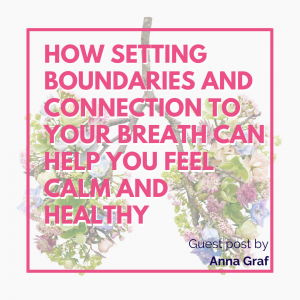Written by my Fall 2020 Apprenticeship Participant, Anna Graf. Interested in joining my next Apprenticeship? Sign up for the waitlist here.
Have you ever felt like it was all on your shoulders?
Maybe you are a working mom, and your husband works too? Or you are a fulltime mom trying to keep everything together? Or you have a demanding job, your parents are getting older, and you have a partner you want to spend time with too?
Do you have any time for yourself? Maybe you feel overwhelmed, sad, anxious, angry? Or do you not feel anything at all? Your throat is narrow, you have a pounding heart, your belly aches? You think you must do it all and don’t deserve any rest? How is your general health? Your immune system? Your cycle? And how is your connection to the world and the people around you? It is all connected.
How stress impacted my pregnancy
Almost three years ago, I felt like this when I was pregnant with my baby boy and my mom had a stroke. I was so stressed out, trying to be there for my mom, my dad, my patients (I am a psychotherapist) and this little miracle growing in my womb.
I felt so guilty towards my unborn son for loading him with so many sad feelings and sometimes even forgetting he was there.
My body responded by telling me to take a break. My cervix shortened and I had to be on bedrest for the last 7 weeks of my pregnancy. In hospital the disconnection with my body continued. They told me not to touch or massage my belly – because it would raise oxytocin that could induce labor, not to kiss my husband too much, not to think about birth too much.
Of course, I listened then, but looking back I am sure it was not good for my soul. There were so many machines beeping all the time, reminding me of my mom’s intensive care bed, which was not good for my traumatized body. My body was in a state of alarm, for the entire time I was in the hospital and I felt so lonely.
On Christmas eve I finally got to go home, but had to stay on bedrest for another 4 weeks. My baby boy was born 5 weeks prematurely, but thankfully he was healthy overall.
It’s all connected.
Our body, emotions, thoughts, intentions, and spirituality (religion, or simply how we feel connected to nature, the world, the people around us or our ancestors) are all interconnected.
In our western society we learned that the Mind, or our thoughts, and our Intentions, or what we do, are the most important things. We learned from a young age to disconnect from our bodies and emotions (“don’t be sad, you just fell…”). We learned to disconnect from our bodily needs and from our emotions so much so that we sometimes do not feel them at all anymore. We don’t go to the bathroom when we need to, we don’t get enough sleep, we don’t eat enough.
Add to that our society’s expectations toward women.
We have to do it all and be it all. Our body is constantly sending us signs that we should take better care of ourselves. The signals can be as loud as during my first pregnancy or they can be quieter, like having a cold very often, having chronic body aches, an irregular cycle or sleep issues.
Maybe you feel betrayed by your body and think it’s working against you – I certainly felt this way for not being able to have a “normal” pregnancy.
But your body is never working against you. She cares deeply for you. And just wants you to feel and listen to her. She wants to save you from perceived danger. She still works as your ancestor’s bodies did when there was no constant stress like deadlines, work, societal expectations and stressful thoughts.
Stress looks different but our bodies are the same
Our ancestors stressed about different things, like tigers attacking them. In a stressful situation your body activates the sympathetic nervous system making you able to run away from dangerous situations or fight. Cortisol and epinephrine rise, you breathe more heavily, blood runs to your arms and legs, your heart pumps, and the focus is taken away from reproduction, immunity, and digestion.
For your body to work optimally it is important to be in the parasympathetic (rest and digest) mode most of the time.
So, what can you do to help your body be in the parasympathetic mode?
- Slow down.
- Breathe into your belly and listen to what your body is telling you.
- Take some time to feel your body and your emotions. This is called a body scan exercise, and there are plenty of them on the internet or on meditation apps.
- Journal.
- Set boundaries.
Setting boundaries can feel hard, so here is an easy body psychotherapy exercise to help you try to feel how much space you need for yourself in the moment. You make a circle around yourself in the size of your needed space with a rope or using a piece of chalk. Feel what happens. Often clients say they feel safer, breathe deeper, and feel more relaxed.
In a study where participants of three groups (one who did the boundary exercise, one who was supported by their partners, and one without any support) had to do a job interview (Froesch, 2003), participants of the boundary group felt calmer, in a better mood and less anxious and even had lower cortisol levels compared to the other two groups.
In conclusion…
Before getting pregnant again I took some psychotherapy sessions myself to work through the traumas of my first pregnancy. I am now 39 weeks pregnant, and I have had no complications so far. During this pregnancy I have listened to my body, and I stopped working full time in month 3 and took some time to rest while my son was at my parents or daycare. I breathed. I meditated. And I touched my belly often. I feel like it’s going to be so different this time.
Source
Froesch, M.: Stress und Grenzenziehen: psychologische Effekte einer körperorientierten Intervention auf akuten sozialen Stress. Unveröff. Lizentiatsarbeit, psychologisches Institut, Abt. Klinische Psychologie und Psychotherapie, Zürich 2003.
About Anna

Anna Graf, MSc. Is a certified body psychotherapist and works in a private practice with adult clients in Switzerland. She is mom of a two year old boy and currently pregnant again with her baby girl. She is the founder of Mutterspiel, a group course designed for mothers to learn to take better care of themselves, live a cyclical life and be in touch with their sexuality and their partner. She recently finished Nicole Jardim’s Fix Your Period Apprenticeship Program focusing on women’s health, sisterhood and soul aligned business. You can connect with Anna here, or on her Instagram @mutterspiel.



